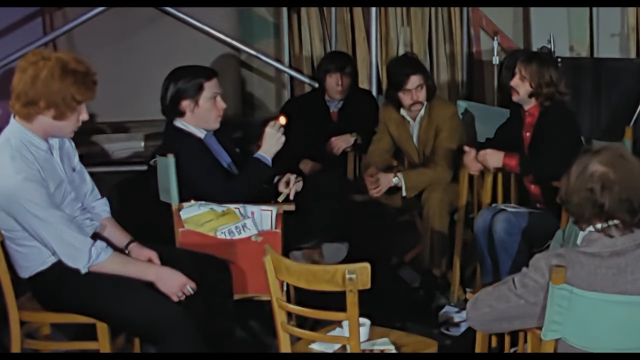I am fascinated by my own response to Get Back – Peter Jackson’s documentary on The Beatles as they recorded what would become Let It Be, utilising footage shot by Michael Lindsay-Hogg. On the one hand, there is very clearly too much of it; one is almost overwhelmed by hearing snippets of ninety takes of the same songs, ninety variations on ‘good morning!’, ninety banal conversations about nothing. There are many profound moments in the series; Paul McCartney seeming to pull “Get Back” out of nothing right before our eyes is one of the most famous, but I also enjoy George Harrison’s rather cynical take on McCartney and John Lennon’s wistful nostalgia for their India trip, Lennon’s improvised poem when he happens to look over at the camera, and “George… do you know what kind of music we play?”, which is all of Lennon’s wit and cruelty crushed into one line. Jackson could simply have shown us all these good bits in one smooth narrative.
On the other hand – okay, this always sounds pretentious as hell whenever anybody says it, but it’s unfortunately true: burying us under the boring shit feels like an effective and helpful point in and of itself. Jackson’s stated goal was to show that the narrative of the band all hating each other at this point in their career was overblown, and to show the joy they all had working together. I think he achieves that by virtue of showing what feels like every inane moment of their lives for that almost-a-month of recording the album. It feels like we’re experiencing the work side of Being A Beatle alongside them, and it makes the moments where it all comes together more beautiful and the moments of aggressiveness and arguments more frustrating (why are you guys wasting your time with this when you could be recording “Get Back”???). The banality ends up structuring the specialness – showing that there was a functional system holding up what we saw.
This ends up resonating with other stories I like. Part of the fun of Grand Theft Auto: San Andreas is that it’s absurdly long, especially by the standards of action video games – one hundred and fifty hours in the main story in a genre that generally asks for thirteen hours of your time, where the absurd length creates an epic scope and epic scale. It’s also what I generally like about episodic TV, where the weight of so much time with our characters – highs and lows and banal experiences and in-jokes alongside the epic story beats – create a complex sense of a person and a chemistry.
What are works that benefit from there being a lot of them?

